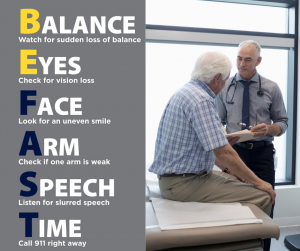It was February 17, 2023, and Ricki Hellner of Burlington, CT was having a normal Friday morning. She had been up at 5:00 a.m. to head down to her barn to muck the stalls and care for her horses and sheep. She felt great. Before getting online to start work which she does remotely from home, she decided to catch up on some knitting. At 9:50 a.m. she decided it was time to get ready for work when she noticed her right hand had gone numb. She brushed it off as the repetitive motion of knitting too long was the cause. As she stood up, her right leg was not working, again she brushed it off as my leg fell asleep.
She got herself some water and prepared to work for the day, when she went to step down into her office and couldn’t make the step, she started not to feel well and thought “Something isn’t right.”
Like many women, Ricki spends a lot of time taking care of others over herself and doesn’t often think much of her aches and pains often attributing it to something else.
“It wasn’t painful or anything like that it was just a tingling and numbness in my right arm and my right leg, and I wasn’t ever thinking stroke,” says Hellner. “It wasn’t like shooting pain or anything like that it was more like this intense pressure.”
She called her husband and told him to come home from work, she was concerned about the horses out in the paddock and didn’t want to call an ambulance. They put away the horses in the barn, something she looks back on and thinks “I probably shouldn’t have done that.” She called her regular primary care physician’s office who told her that they thought she was having a stroke and to go right to the Emergency Department (ED), not an urgent care.

Her husband drove her immediately to UConn John Dempsey Hospital’s ED. In retrospect, she says that was one of her missteps and she should have called an ambulance. An ambulance would have gotten her to the hospital faster and would have called a stroke code activating the stroke team in the ED.
By the time she arrived at the ED her blood pressure was extremely high. A stroke code was called, and a CT scan determined that she was having an ischemic stroke, which happens when blood flow to the brain is blocked by a blood clot. She was still within the four- and half-hour time period to receive Thrombolytic therapy (tissue plasminogen activator: tPA) which is a strong clot-busting medication, given intravenously, that dissolves the blood clot and reconstitutes the blood flow and oxygen to the brain.
After just a couple of days in the ICU, Hellner was able to go home and only needed a little physical and occupational therapy. She credits the quick treatment and ability to receive the tPA for this.
“Time is Brain: the sooner you are evaluated and treated, the greater your odds that what could be a major stroke will be less serious, increasing the chances of a successful recovery,” says Dr. Gracia Mui, assistant professor of Neurology at UConn Health.
“I count myself as incredibly lucky I went right to the ER and I was able to have the tPA within four hours,” says Hellner. “The care at UConn Health was wonderful, I can’t say enough good things about it.”
She still has some minor residual issues with her right foot that is a little off but now she talks to others about self-care which was always foreign to her. When she thinks back about the week before this happened she recalls that Wednesday she was working on her laptop working and she had flashes of light in her eyes which she attributed to her eyes being tired so she decided to take a break and go down to the barn and switch out the horses and as she was walking down there she started tripping on her right foot, it was all of a sudden not working right.
“When I look back at it, I think that was probably a sign, but it wasn’t an overwhelming thing to me, it was somewhat subtle,” says Hellner. “But again, I haven’t always been the best at paying attention to my body, it’s my personality to make sure everybody else is OK.”
Hellner has been fortunate in her life to be healthy and isn’t on medications so she’s not sure what caused the stroke and is currently working with the neurology and cardiology teams to test and rule out any issues that may have caused the stroke.
Since the stroke, she has given herself the freedom to put herself first. Her husband and sons have been wonderful at shifting their expectations and working as a team. She is mindful of what she eats and takes her blood pressure daily. She follows the advice of Dr. Mui who has told her if you feel tired, you need to rest.
“That’s probably the best advice ever because resting used to make me feel guilty, now I know that it is important,” says Hellner.
Hellner now practices mindfulness and owns that it is okay to ask for help.
She wants others to know that she had a misconception that a stroke would be painful, and it wasn’t it was extremely uncomfortable with intense pressure and the importance of being mindful of your symptoms.
Know the warning signs and symptoms of stroke so that you can act fast if you or someone you know might be having a stroke. The chances of survival are greater when emergency treatment begins quickly.
 A simple way to remember the warning signs of stroke is BE FAST:
A simple way to remember the warning signs of stroke is BE FAST:
B – BALANCE: Watch for a sudden loss of balance
E – EYES: Check for vision loss
F – FACE: Does one side of the face droop or is it numb? Ask the person to smile. Is the person’s smile uneven?
A – ARM: Is one arm weak or numb? Ask the person to raise both arms. Does one arm drift downward?
S – SPEECH: Is speech slurred? Is the person unable to speak or hard to understand? Ask the person to repeat a simple sentence, like “The sky is blue.” Is the sentence repeated correctly?
T – TIME: If someone shows any of these symptoms, even if the symptoms go away, call 9-1-1 and get the person to the hospital immediately. Check the time so you’ll know when the first symptoms appeared.
Additional symptoms of stroke include:
• Numbness or weakness of the face arm and/or leg
• Acute Vision Changes
• Difficulty in speaking
• Trouble understanding simple statements
• Confusion
• Trouble in walking or maintaining balance
• Sudden severe headache
The Stroke Center at UConn Health has received the American Heart Association/American Stroke Association’s Get With The Guidelines®– Stroke Gold Plus Quality Achievement Award for the past four years and has attained the advanced certification by The Joint Commission as an Advanced Thrombectomy-Capable Stroke Center. UConn Health is only the second Advanced Thrombectomy-Capable Stroke Center in Connecticut and the first in the Hartford region.
For more information, visit UConn Health Stroke Center.
UConn Health will host the Emergency Stroke Care Symposium on Thursday, June 15, 2023, 8:00 AM – 4:00 PM
Emergency Medical Services: A Critical Link in Stroke Care
The most current advances and techniques in endovascular therapy and neurocritical care for the management of stroke and other complex neurological disorders are taught by UConn Health’s world-renowned and experienced faculty.
Learn how the multidisciplinary team at UConn Health’s Stroke Center provides collaborative and personalized care for complex stroke patients to optimize their outcomes.
The Emergency Stroke Care Symposium is free and open to health care providers and first responders involved at any point in acute stroke patient care. You can register for the symposium which will be held in-person and virtually.



